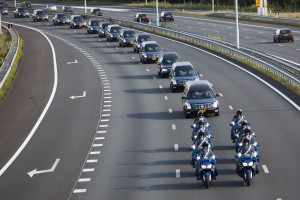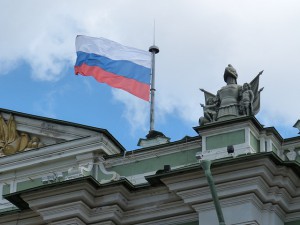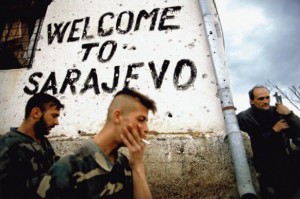 The recent passing away of US Supreme Court Justice Scalia has inevitably thrust his – often dissenting – opinions into the limelight. Little attention has been paid, however, to Scalia’s approach to international law in his opinions. It is an easy and understandable temptation to characterize Scalia as an American sovereigntist viscerally opposed to international law influences on Supreme Court judgments and the US legal system at large. The reality of his opinion-writing is more complex, however; some opinions are indeed hostile to international law, while others far less so.
The recent passing away of US Supreme Court Justice Scalia has inevitably thrust his – often dissenting – opinions into the limelight. Little attention has been paid, however, to Scalia’s approach to international law in his opinions. It is an easy and understandable temptation to characterize Scalia as an American sovereigntist viscerally opposed to international law influences on Supreme Court judgments and the US legal system at large. The reality of his opinion-writing is more complex, however; some opinions are indeed hostile to international law, while others far less so.
Lees verder
Auteursarchief: Cedric Ryngaert
Reactie op ‘MH17-proces wordt erg lastig in Nederland’
 In ‘MH17-proces wordt erg lastig in Nederland’ (NRC 20 januari 2016) maakt het NRC melding van een discussie over de draagwijdte van artikel 552y van het Wetboek van Strafvordering. De Nederlandse overheid zou deze bepaling willen aangrijpen om voor een Nederland voor een Nederlandse rechtbank gerechtigheid voor de MH17-crash te laten geschieden voor alle slachtoffers, dus niet enkel deze met de Nederlandse nationaliteit. Aangezien het grootste deel van de slachtoffers de Nederlandse nationaliteit, komt Nederland onvermijdelijk in beeld. Nederland heeft het veiligheidsonderzoek uitgevoerd en leidt het joint investigative team, de Nederlandse strafwet maakt berechting voor moord mogelijk, zelfs in de fysieke afwezigheid van de dader, en Nederland staat internationaal bekend om zijn onpartijdige en onafhankelijke rechtspraak. Nederland lijkt me zonder meer in staat het MH17-proces tot een goed einde te brengen. Opdat dit proces aan legitimiteit zou winnen, lijkt het me evenwel raadzaam ook andere landen te betrekken bij de berechting. Lees verder
In ‘MH17-proces wordt erg lastig in Nederland’ (NRC 20 januari 2016) maakt het NRC melding van een discussie over de draagwijdte van artikel 552y van het Wetboek van Strafvordering. De Nederlandse overheid zou deze bepaling willen aangrijpen om voor een Nederland voor een Nederlandse rechtbank gerechtigheid voor de MH17-crash te laten geschieden voor alle slachtoffers, dus niet enkel deze met de Nederlandse nationaliteit. Aangezien het grootste deel van de slachtoffers de Nederlandse nationaliteit, komt Nederland onvermijdelijk in beeld. Nederland heeft het veiligheidsonderzoek uitgevoerd en leidt het joint investigative team, de Nederlandse strafwet maakt berechting voor moord mogelijk, zelfs in de fysieke afwezigheid van de dader, en Nederland staat internationaal bekend om zijn onpartijdige en onafhankelijke rechtspraak. Nederland lijkt me zonder meer in staat het MH17-proces tot een goed einde te brengen. Opdat dit proces aan legitimiteit zou winnen, lijkt het me evenwel raadzaam ook andere landen te betrekken bij de berechting. Lees verder
The Yukos saga continued: Russia retaliates against attempts in the West to seize Russian assets
 In an earlier blogpost, I reported that a number of Western states envisaged lifting the immunity from execution of the Russian Federation and seizing Russian government assets. They did so at the request of creditors seeking to enforce a 50 billion dollar award issued by a Hague-based international investment tribunal in a case about the expropriation of the Yukos energy company. Russian retaliation against these measures was to be expected. Russian pressure resulted rather swiftly in Belgium unfreezing the seizure of Russian bank accounts. Now, as reported by the Kremlin-backed news outlet Russia Today, in a move that is set to further deteriorate relations between Russia and the West, Russian President Vladimir Putin has also signed a law that allows Russia to seize assets of foreign states which wrongfully seized Russian property (for those who read Russian: the text of the law is available here). While this law could easily be characterized as the umpteenth example of Russian bare-knuckle power politics, it is nonetheless not necessarily internationally unlawful. Lees verder
In an earlier blogpost, I reported that a number of Western states envisaged lifting the immunity from execution of the Russian Federation and seizing Russian government assets. They did so at the request of creditors seeking to enforce a 50 billion dollar award issued by a Hague-based international investment tribunal in a case about the expropriation of the Yukos energy company. Russian retaliation against these measures was to be expected. Russian pressure resulted rather swiftly in Belgium unfreezing the seizure of Russian bank accounts. Now, as reported by the Kremlin-backed news outlet Russia Today, in a move that is set to further deteriorate relations between Russia and the West, Russian President Vladimir Putin has also signed a law that allows Russia to seize assets of foreign states which wrongfully seized Russian property (for those who read Russian: the text of the law is available here). While this law could easily be characterized as the umpteenth example of Russian bare-knuckle power politics, it is nonetheless not necessarily internationally unlawful. Lees verder
Enforcing the Yukos arbitral award: overcoming the state immunity defense
 Recently, it was reported that bank accounts belonging to the Russian Federation had been frozen in Belgium and France after requests to this effect from shareholders of the now defunct Yukos corporation, which had been dismantled by Russia in 2001 (The Economist). Belgian authorities rather swiftly lifted the enforcement measures following fierce Russian protests and threats of retaliation. This post is in favor of taking creditors’ interests seriously, and recommends limiting the circumstances in which the state could invoke immunity from execution. Lees verder
Recently, it was reported that bank accounts belonging to the Russian Federation had been frozen in Belgium and France after requests to this effect from shareholders of the now defunct Yukos corporation, which had been dismantled by Russia in 2001 (The Economist). Belgian authorities rather swiftly lifted the enforcement measures following fierce Russian protests and threats of retaliation. This post is in favor of taking creditors’ interests seriously, and recommends limiting the circumstances in which the state could invoke immunity from execution. Lees verder
Srebrenica: Military Chamber of Arnhem Court upholds prosecutor’s decision not to investigate the role of Dutch commanders
 On 29 April 2015, the Military Chamber of the Court of Arnhem-Leeuwarden dismissed a complaint, filed by relatives of victims (Mustafić, Nuhanović) of the Srebrenica massacre, against the Dutch public prosecutor’s decision not to investigate the Dutch military commanders (2013) for murder, war crimes and genocide. The (three) commanders of a Dutch battalion (Dutchbat), deployed under UN auspices in the Srebrenica area, had, according to the plaintiffs, expelled the victims from the Dutchbat compound knowing that they would in all likelihood be killed by Bosnian Serb militia under the command of Ratko Mladic. This post will endeavor to illustrate that, in reviewing the prosecutor’s decision to dismiss, the Court whilst appearing to reach its decision through the application of different law, actually based its jurisprudence on a de novo understanding of the facts compared to the earlier civil cases regarding for the same facts in relation to international civil law (State responsibility). It is recalled that, in the proceedings against the State, the Court of Appeal of The Hague held the Netherlands liable in tort for (the commanders) sending the victims off the compound on the ground that, in so doing, the State exposed them to a real and foreseeable risk of being killed or mistreated (Mustafić and Nuhanović 2011). This judgment was confirmed by the Supreme Court (Mustafić and Nuhanović 2013). In the Arnhem Court case, however, it was ruled that, in respect of those same facts, there was no basis for a criminal investigation because the establishment of individual criminal liability differs fundamentally from the establishment of the State’s civil liability (para. 12.4).
On 29 April 2015, the Military Chamber of the Court of Arnhem-Leeuwarden dismissed a complaint, filed by relatives of victims (Mustafić, Nuhanović) of the Srebrenica massacre, against the Dutch public prosecutor’s decision not to investigate the Dutch military commanders (2013) for murder, war crimes and genocide. The (three) commanders of a Dutch battalion (Dutchbat), deployed under UN auspices in the Srebrenica area, had, according to the plaintiffs, expelled the victims from the Dutchbat compound knowing that they would in all likelihood be killed by Bosnian Serb militia under the command of Ratko Mladic. This post will endeavor to illustrate that, in reviewing the prosecutor’s decision to dismiss, the Court whilst appearing to reach its decision through the application of different law, actually based its jurisprudence on a de novo understanding of the facts compared to the earlier civil cases regarding for the same facts in relation to international civil law (State responsibility). It is recalled that, in the proceedings against the State, the Court of Appeal of The Hague held the Netherlands liable in tort for (the commanders) sending the victims off the compound on the ground that, in so doing, the State exposed them to a real and foreseeable risk of being killed or mistreated (Mustafić and Nuhanović 2011). This judgment was confirmed by the Supreme Court (Mustafić and Nuhanović 2013). In the Arnhem Court case, however, it was ruled that, in respect of those same facts, there was no basis for a criminal investigation because the establishment of individual criminal liability differs fundamentally from the establishment of the State’s civil liability (para. 12.4).
Lees verder
International criminal and civil liability for the downing of MH17: an uphill struggle
 On 26 February 2015, study associations Urios and Ad Informandum organized a symposium on accountability and liability questions concerning the downing of Malaysian Airlines flight MH17 above eastern Ukraine in July 2014. Notably Dr. J.A.C. Bevers (legal advisor to the Prosecutor of the International Criminal Court – hereinafter: ICC) and Mr. M. van den Steenhoven (attorney at Beer Advocaten, who represents the plaintiffs in this case) discussed a number of mechanisms to hold the possible perpetrators liable. The symposium was chaired by one of the authors of this blogpost. In this post we shed light on the potential criminal and civil liability of a number of actors for the MH17 crash. We draw on the discussion as it played out at the symposium. Lees verder
On 26 February 2015, study associations Urios and Ad Informandum organized a symposium on accountability and liability questions concerning the downing of Malaysian Airlines flight MH17 above eastern Ukraine in July 2014. Notably Dr. J.A.C. Bevers (legal advisor to the Prosecutor of the International Criminal Court – hereinafter: ICC) and Mr. M. van den Steenhoven (attorney at Beer Advocaten, who represents the plaintiffs in this case) discussed a number of mechanisms to hold the possible perpetrators liable. The symposium was chaired by one of the authors of this blogpost. In this post we shed light on the potential criminal and civil liability of a number of actors for the MH17 crash. We draw on the discussion as it played out at the symposium. Lees verder
Minister van Justitie verbiedt tenuitvoerlegging van vonnis tegen Europese Octrooiorganisatie: accountability van internationale organisaties blijft ver weg
 Op 17 februari 2015 besliste het Gerechtshof Den Haag in kort geding dat de Europese Octrooiorganisatie (EOO), een intergouvernementele organisatie die een nevenvestiging in Rijswijk heeft, dat de organisatie op onrechtmatige wijze beperkingen had aangebracht aan vakbondsvorming en –communicatie, alsook aan het stakingsrecht. Vervolgens zegde de Minister van Veiligheid en Justitie de gerechtsdeurwaarder evenwel aan het vonnis niet ten uitvoer te leggen omdat tenuitvoerlegging de volkenrechtelijke immuniteit van executie van de EOO zou schenden. Deze aanzegging is weinig bevorderlijk voor de ontwikkeling van de accountability van internationale organisaties, en staat op gespannen voet met de mensenrechten. Lees verder
Op 17 februari 2015 besliste het Gerechtshof Den Haag in kort geding dat de Europese Octrooiorganisatie (EOO), een intergouvernementele organisatie die een nevenvestiging in Rijswijk heeft, dat de organisatie op onrechtmatige wijze beperkingen had aangebracht aan vakbondsvorming en –communicatie, alsook aan het stakingsrecht. Vervolgens zegde de Minister van Veiligheid en Justitie de gerechtsdeurwaarder evenwel aan het vonnis niet ten uitvoer te leggen omdat tenuitvoerlegging de volkenrechtelijke immuniteit van executie van de EOO zou schenden. Deze aanzegging is weinig bevorderlijk voor de ontwikkeling van de accountability van internationale organisaties, en staat op gespannen voet met de mensenrechten. Lees verder
Does the European Court of Human Rights read the UCall blog? Court makes U-turn in life imprisonment cases
Does the European Court of Human Rights (ECtHR) read the UCall blog? One would almost be inclined to believe so. In an earlier UCall blogpost, we criticized the Court’s approach to life imprisonment cases. In particular, we took issue with the imposition of a strict version of the European rehabilitation approach to penalties (‘the right to hope’) on third states. It is recalled that in Trabelsi v. Belgium (2014), the Court found Belgium in violation of Article 3 ECHR – the prohibition of inhuman treatment – by exposing presumed terrorist Trabelsi to the risk of an irreducible life sentence by extraditing him to the United States. We took the view that in this case, the Court did not do sufficient justice to the possibility of earlier release in the United States, e.g., through presidential pardon, and voiced concerns over the viability of transatlantic anti-terrorism cooperation. Lees verder
European Court of Human Rights (ECtHR) read the UCall blog? One would almost be inclined to believe so. In an earlier UCall blogpost, we criticized the Court’s approach to life imprisonment cases. In particular, we took issue with the imposition of a strict version of the European rehabilitation approach to penalties (‘the right to hope’) on third states. It is recalled that in Trabelsi v. Belgium (2014), the Court found Belgium in violation of Article 3 ECHR – the prohibition of inhuman treatment – by exposing presumed terrorist Trabelsi to the risk of an irreducible life sentence by extraditing him to the United States. We took the view that in this case, the Court did not do sufficient justice to the possibility of earlier release in the United States, e.g., through presidential pardon, and voiced concerns over the viability of transatlantic anti-terrorism cooperation. Lees verder
Internationaal Gerechtshof acht Servië noch Kroatië aansprakelijk voor vermeende genocide begaan tijdens het Balkan-conflict
 Het vonnis van het Internationaal Gerechtshof (IGH) in Application of the Convention on the Prevention and Punishment of the Crime of Genocide (Croatia v. Serbia), 3 februari 2015 , is de zoveelste gerechtelijke beslissing met betrekking tot de gruwelijkheden begaan tijdens de oorlogen die zich in de jaren 1990 in het voormalige Joegoslavië afspeelden. Eerder werden vonnissen geveld door het Internationaal Straftribunaal voor het voormalige Joegoslavië (ICTY – specifiek in het leven groepen om tijdens die oorlogen begane misdrijven te berechten), door nationale rechtbanken in het voormalige Joegoslavië en daarbuiten (zoals in Nederland), en door het IGH zelf, in een zaak tussen Bosnië-Herzegovina en Servië. Lees verder
Het vonnis van het Internationaal Gerechtshof (IGH) in Application of the Convention on the Prevention and Punishment of the Crime of Genocide (Croatia v. Serbia), 3 februari 2015 , is de zoveelste gerechtelijke beslissing met betrekking tot de gruwelijkheden begaan tijdens de oorlogen die zich in de jaren 1990 in het voormalige Joegoslavië afspeelden. Eerder werden vonnissen geveld door het Internationaal Straftribunaal voor het voormalige Joegoslavië (ICTY – specifiek in het leven groepen om tijdens die oorlogen begane misdrijven te berechten), door nationale rechtbanken in het voormalige Joegoslavië en daarbuiten (zoals in Nederland), en door het IGH zelf, in een zaak tussen Bosnië-Herzegovina en Servië. Lees verder
Extradition of Terrorism Suspects: European Court of Human Rights Rules on the Compatibility of Life without Parole with the European Convention. The Case of Nizar Trabelsi v. Belgium
 On the 4th of September 2014, the European Court of Human Rights handed down its judgment in the case of Trabelsi v. Belgium. Ending a decade-long debate the Court ruled that Belgium’s extradition of terrorist suspect Nizar Trabelsi to the United States is a violation of art.3 of the European Convention of Human Rights (ECHR). In the Court’s view, the prospect of receiving a life sentence without parole constituted prohibited inhuman treatment. This case is built on earlier cases on extradition to non-Convention Parties and raises contentious questions regarding the scope of art.3 ECHR and the balance between the fight against terrorism and human rights.
On the 4th of September 2014, the European Court of Human Rights handed down its judgment in the case of Trabelsi v. Belgium. Ending a decade-long debate the Court ruled that Belgium’s extradition of terrorist suspect Nizar Trabelsi to the United States is a violation of art.3 of the European Convention of Human Rights (ECHR). In the Court’s view, the prospect of receiving a life sentence without parole constituted prohibited inhuman treatment. This case is built on earlier cases on extradition to non-Convention Parties and raises contentious questions regarding the scope of art.3 ECHR and the balance between the fight against terrorism and human rights.
Lees verder

